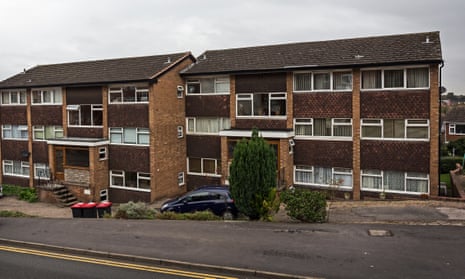The freehold to a 1960s block of flats near Birmingham regarded as the worst example of leasehold abuse in Britain will be auctioned on Thursday, as a new report warns that the leasehold system is on borrowed time.
Buyers of the one-bedroom flats in Coleshill have been forced to pay as much as £8,000 a year in ground rent – an annual bill that could escalate to as high as £8m after 95 years – and say their homes have been made worthless. But their controversial freeholder hopes to cash in by selling the rights to the spiralling ground rents at an auction in London.
The move comes as a report by the Law Commission, a statutory independent body that advises on law reform, signals the potential end of leaseholds and their replacement with ‘commonhold’.
But for buyers of the flats in Coleshill, the nightmare continues. Kadian Kennelly, who bought her flat in 2015 for £58,000 expecting the ground rent to be £250, was almost immediately presented with a bill for £8,000 by the freeholder, Martin Paine.
Kennelly, a 36-year-old social worker, said she could no longer face living at Blythe Court and had moved out. “I don’t live there. I won’t want to stay there. It’s too depressing and daunting, so I don’t live there,” she said.
Another owner said: “I’ve shouted down the phone in the past at them: ‘Have you got any morals?’ But they just take the money and don’t care.”
The owner, who asked not to be named because of the uncertainty of the situation, said: “At the moment we feel our homes are worthless. There’s no way we would get the going rate [probably in the region of £120,000].
“Mortgage companies are reluctant to give mortgages for properties with short leases so the value comes down. It would be nice to hand the place down to children but it may not be worth anything. That’s sad.”
The auction particulars reveal the complex web of ground rents created by Paine, one of the most controversial freeholders in the country. In a 2016 House of Commons debate Sir Peter Bottomley said: “One crook is Martin Paine, who has taken ‘lease’ beyond sleaze, almost by adding a letter at the beginning, and into an art form.”
The 12 near-identical flats in the block have varying leases, all dating back to 1961. Flat 7 is listed as having a ground rent of £8,000 a year, doubling every 10 years over its 149-year life. Flat 5 has a ground rent of £3,200 a year, doubling every 10 years over 190 years. But flat 9 has a ground rent of just £12 a year, fixed for 99 years.
Martin Boyd of campaign group Leasehold Knowledge Partnership said: “The leaseholders in this block have faced perhaps one of the worst examples of a freeholder seeking to impose unjustified and onerous ground rent terms. It seems too many conveyancing solicitors have missed the way in which the freeholder has introduced ground rent terms during a lease extension which makes some of these flats worthless.”
Blythe Court’s freehold is owned by Mercia Investment Properties, one of 16 property companies where Paine is a director. In a statement it said: “We are selling the freehold reversion for Blythe Court as part of our ongoing business development programme.
“Mercia Investment Properties has endeavoured to be fair and open about resolving issues with tenants and has worked with tenants’ solicitors to ensure their clients were correctly advised before rental agreements were entered into. Similarly, we served all of the statutory notices on the tenants prior to the planned auction.”
Leasehold has expanded rapidly in recent years as apartment construction has boomed, with 46% of all newbuild homes in 2016 registered as leasehold. But the Law Commission report said that the leasehold system is now “on borrowed time”.
Law Commissioner professor Nick Hopkins said: “It’s clear leasehold law is a problem, with some managing agents charging over the odds for the upkeep of shared areas, and the process of extending a lease costly and time consuming.”
The Commission has set an eight-week deadline for evidence about switching from leasehold to commonhold, which was introduced in 2002 and allows a person to own a freehold ‘unit’ – like a flat within a building – and at the same time be a member of the company which manages the shared areas and buildings. Under leasehold, however, a home buyer agrees to lease a property for a fixed number of years, typically 99, with the property ultimately reverting to the freeholder unless the lease is extended.
“Commonhold provides an alternative – giving unlimited ownership of a property and a stake in how the rest of the building or shared area is managed. But fewer than 20 have been created in the last 14 years,” said the commission. “We want to find out what’s stopping people, and how the law could be improved to make commonhold more common.”
Meanwhile Catherine Mills, a retired GP’s receptionist who has lived in her top floor flat in Blythe Court for 20 years, will be watching for the results of the auction. “I’m a longterm resident of this block of flats,” she said. “We’re hoping there will be a resolution that suits all parties.”
